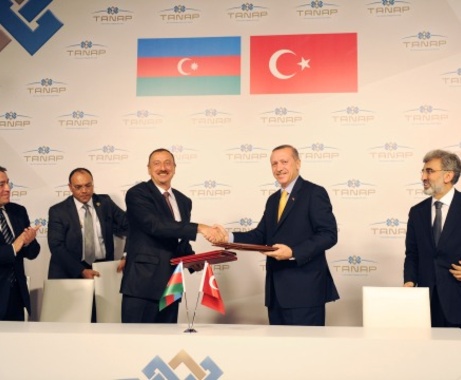
Azerbaijan Drives the Planning on Trans-Anatolia Gas Pipeline Project
Publication: Eurasia Daily Monitor Volume: 9 Issue: 164
By:

The Azerbaijani-Turkish Trans-Anatolia gas pipeline project (TANAP) for Caspian gas to Europe seems set to grow in scope and strategic ambitions. The line is planned to run from the Georgia-Turkey border to the Turkey–European Union border. The project’s initiator, Azerbaijan, is driving its growth in tandem with Turkey. Baku’s proposals currently on the table include: broadening the project’s shareholder composition; massively enlarging TANAP’s ultimate capacity; and correspondingly boosting the capacity of the existing pipeline from Baku across Azerbaijan and Georgia (see below), to the inception point of TANAP in Turkey.
Under the project agreement, signed on June 26, Azerbaijan’s State Oil Company (SOCAR) holds 80 percent of TANAP’s shares as well as operating rights; Turkey’s Botas state pipeline company holds 15 percent, and Turkish Petroleum five percent. Baku had announced from the outset that it would sell minority stakes in TANAP to eligible partners, but it would retain a controlling stake and the operator’s role. Consequently, Baku is now inviting British Petroleum (BP), Norway’s Statoil and Total of France to acquire minority stakes in TANAP.
These companies qualify because they are shareholders in the Shah Deniz gas producers’ consortium; they will be using the Trans-Anatolia pipeline to Europe (there is no other option after BP’s alternative option lost out to TANAP); they will invest in TANAP proportionately with their stakes (as will Azerbaijan as majority shareholder); and beyond Shah Deniz they are involved in other Azerbaijani gas projects, motivating these companies to use the TANAP pipeline for growing gas volumes in the future. According to SOCAR’s president, Rovnag Abdullayev, Shah Deniz gas producers acquiring minority stakes in TANAP will pay the same transit fees as SOCAR under the Azerbaijani-Turkish June 26 agreement, on a non-discriminatory basis (Trend, September 4, 6).
Beyond the Shah Deniz project, BP and Statoil also are involved in the Azeri-Chirag-Guneshli oil project consortium, which plans to develop the deep-level gas deposits (ACG Deep Gas) under the oil strata; BP also has a production-sharing agreement to develop the Shafag-Asiman gas field, and Total for the Absheron gas field. Azerbaijan’s State Oil Company is a shareholder in all these offshore gas development projects. These will substantially add to Shah Deniz production in the future, necessitating capacity increases for the TANAP pipeline to Europe. Transit of gas from Turkmenistan (depending on construction of a trans-Caspian pipeline to Azerbaijan) would require capacity increases in TANAP on a growing scale in the future.
Baku and Ankara now propose to configure TANAP for an ultimate capacity of 60 billion cubic meters (bcm) per year, so as to accommodate future gas flows from both Azerbaijan and Turkmenistan to Europe (Today.Az, September 6; Zaman, September 9). The 60 bcm target would double the 31 bcm capacity announced in the wake of the June agreement’s signing.
The more ambitious target reflects in part Turkey’s decision to join forces with the European Union in encouraging the construction of a trans-Caspian gas pipeline for Turkmen gas. Ankara has just offered to buy and transport massive volumes of Turkmenistani gas to Europe through the TANAP pipeline, counting on a trans-Caspian line and onward transit via Azerbaijani (see “Turkey Sees Opportunity in Trans-Caspian Gas Pipeline Project,” EDM, September 11). This would presuppose major capacity expansion in the Trans-Anatolia pipeline as part of the EU’s Southern Corridor.
TANAP is designed as a scalable pipeline, its capacity to be increased in four consecutive phases by adding parallel loops and compressor power, in step with production growth upstream. Even before Ankara’s offer to Ashgabat (see above), top SOCAR executives had occasionally hinted at an ultimate capacity of 60 bcm, reflecting an interest in maximizing the gas flow through Azerbaijan and the TANAP pipeline to Europe. Planning assumptions at this point envisage the start of TANAP construction work in late 2013 or early 2014, first gas flow in 2018 (when Shah Deniz Phase Two production is due on stream), and scaling up TANAP’s capacity to 16 bcm per year by 2020, 23 bcm by 2023, and 31 bcm per year by 2026, at an estimated cost of $7 billion for reaching the 31-bcm capacity (APA, September 6).
The South Caucasus (SCP) gas pipeline (also known as the Baku-Tbilisi-Erzurum pipeline) provides the connecting link between the Caspian littoral and TANAP in Turkey. Gas flows from Azerbaijan and Turkmenistan, moving across Azerbaijan and Georgia, would enter the Trans-Anatolia pipeline directly from the SCP pipeline. SCP’s capacity, therefore, needs to be increased to the same levels as TANAP’s capacity. The SCP’s starting point is near Baku at Sangachal, the reception terminal for offshore gas from Shah Deniz, potentially also for “non-Shah Deniz” Azerbaijani gas in the future. Moreover, Sangachal is the Azerbaijani terminus of the proposed trans-Caspian pipeline from Turkmenistan.
BP has announced plans to expand the SCP’s capacity, from 7 or 8 bcm annually at present (under-utilized) to 22 bcm per year by 2017 or 2018, for exporting Shah Deniz Phase Two production to Turkey and via Turkey to Europe. This proposal falls short of accommodating future Azerbaijani gas export volumes, let alone volumes from Turkmenistan (contingent on a trans-Caspian pipeline being built). The SCP’s capacity must correspond with TANAP’s capacity if TANAP is to become a reality. Unsurprisingly, Azerbaijan calls for expanding the SCP’s annual capacity up to 60 bcm. Toward that goal, Baku proposes to build a second (parallel) line, with scalable capacity, majority-owned and operated by Azerbaijan on its territory and in Georgia (see EDM, June 7; SAM Center for Strategic Studies, “Azerbaijani Gas Strategy and the EU’s Southern Corridor,” Baku, August 2012).
The Shah Deniz producers’ consortium and the SCP pipeline consortium are distinct entities, but their shareholder composition is identical: British Petroleum (BP) and Norway’s Statoil with 25.5 percent each; Azerbaijan’s State Oil Company, Total of France, Russian Lukoil, and Iran’s Naftiran with ten percent each; and Turkish Petroleum with nine percent of the shares. BP is the technical operator of both the Shah Deniz extraction project and the SCP pipeline.
As minority shareholder in those projects, Baku seeks to enhance its decision-making influence and its prospective revenues in a new role: that of majority shareholder and operator in the planned TANAP and the scaled-up SCP pipeline. Thanks to effective management of its oil revenues, Azerbaijan is now capable of multi-billion dollar reinvestment into its future as a significant gas exporter and transit route to Europe, in tandem with Turkey on the Southern Corridor.




